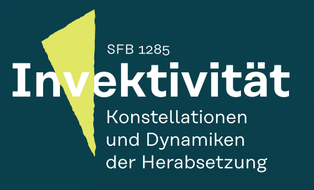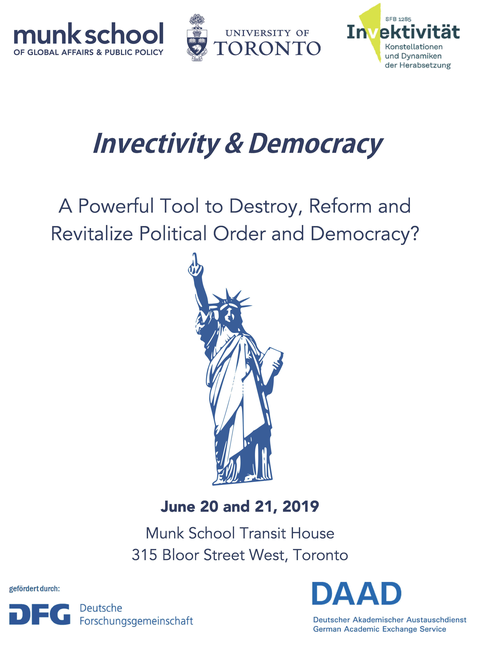20.06.2019 - 21.06.2019; Tagung
Invectivity & Democracy – A Powerful Tool to Destroy, Reform and Revitalize Political Order/Democracy?
Dagmar Ellerbrock (University of Toronto/Universität Dresden);
Andres Kasekamp (University of Toronto);
Katja Kanzler (University of Leipzig; SFB 1285);
Sabine Müller-Mall (Universität Dresden; SFB 1285)
Invectivity & Democracy – A Powerful Tool to Destroy, Reform and Revitalize
Political Order/Democracy?
June 20–21, 2019
Joint Initiative in German and European Studies
Munk School of Global Affairs and Public Policy, University of Toronto
Sonderforschungsbereich 1285, Technische Universität Dresden
Convenors: Dagmar Ellerbrock (University of Toronto/Universität Dresden); Andres
Kasekamp (University of Toronto); Katja Kanzler (University of Leipzig; SFB
1285); Sabine Müller-Mall (Universität Dresden; SFB 1285),
Democracies are at stake (Levitsky and Ziblatt), democracy has died, and liberalism has failed (Deneen 2018). These seem to be the depressing but prevalent perceptions these days (Kufferath 2018). At centre stage are rising right-wing populist movements all over the world. Making matters worse is the decay of US politics, which are no longer acting as a safeguard of democracy but instead are starting to undermine democratic institutions and weaken democratic procedures, with implications for the entire world.
One common characteristic of these developments is in the role that humiliation and shaming play in them. This conference therefore aims to investigate the dynamics and functions of disparagement – widely conceived – in and for democracies. Are disparagement-related emotions within politics always a threat to the political order? Or can they become a resource of renewal and revitalise political practices? If so, under what conditions? To answer these questions, we have to gain a deeper understanding of derogatory language and practices: What effects do insults have in various historical constellations? How do derogatory practices gain social traction, how are they introduced, authorized, rehearsed, but also contested in cultural materials and practices? How does offensive discourse change institutional settings, emotional
regimes, and public as well as political spaces?
The conference will use as a point of departure the concept of “invectivity” – a neologism defined by the Dresden Collaborative Research Centre as “verbal and nonverbal, oral and written, gestural and pictorial communicationive practices that are capable of degrading, offending or excluding others.” Invectivity has the power to produce, define, stabilise or change social and political structures. From this perspective, the changes in political and public communicationthat we are currently observing are indeed crucial for understanding the contemporary state of democracy as well as for assessing past and future developments. (Konzeptgruppe Invektivität 2017)
Closely linked to acts of humiliation are various emotions: feeling ashamed, powerless or terrified can be typical reactions to invective practises, but so can anger or feelings of being entertained, stimulated, and activated.
This highly dynamic potential makes invectivity a powerful tool for the shaping of social order. Its productive social effects can as much support movements of reform and progress as they may encourage revisionist, anti-liberal, and anti-democratic forces This productivity is based on invectivity’s capacity to create effects of inclusion and exclusion, of social fragmentation and integration.
The conference aims to accomplish the following:
1. Analyse invective communication and practises in different historical, medial, and societal contexts and explore the communicative strategies and emotional resonances related to invectivity;
2. Examine the dynamics of invective phenomena and the changes they set in motion on a larger or smaller societal scale; and
3. Study the effects of mobilisation achieved through invective practises
In pursuing these objectives, we wish to focus on the following areas of inquiry:
1. The formation and mobilisation of social movements by invective communication;
2. The relationship between invective scripts in popular media culture and right-wing
populism;
3. The impact of invective practises on formations and transformations of public
communication/public space; and
4. The challenges and opportunities posed by invectivity in and for political orders.
The conference will bring together scholars from different disciplines in order to compare the characteristics, effects, and emotions of invective practices in different societies and historical settings. Concentrating on the dynamics and productivity of invectivity will broaden our understanding of derogatory communication and produce a deeper understanding of why there are certain circumstances and conditions when shame-oriented communications can produce necessary reform and become a powerful tool for democracy. We will also investigate, however, how invectivity can become a disruptor of peaceful social order.
References
Deneen, Patrick J. 2018. Why Liberalism Failed. Politics and Culture. New Haven: Yale
University Press.
Konzeptgruppe Invektivität. 2017. “Invektivität - Perspektiven eines neuen
Forschungsprogramms in den Kultur- und Sozialwissenschaften.” Kulturwissenschaftliche Zeitschrift 2 (1): 2–24. doi:10.2478/kwg-2017-0001.
Kufferath, Philipp, ed. 2018. Demokratie praktizieren: Arenen, Prozesse und Umbrüche
politischer Partizipation in Westeuropa im 19. und 20. Jahrhundert. Archiv für
Sozialgeschichte 58. Band. Bonn: Dietz.
Levitsky, Steven, and Daniel Ziblatt. How democracies die: What history tells us about our future.
Here you can download:
 © SFB 1285
© SFB 1285
Sonderforschungsbereich 1285: "Invektivität. Konstellationen und Dynamiken der Herabsetzung"
Eine verschlüsselte E-Mail über das SecureMail-Portal versenden (nur für TUD-externe Personen).
Besuchsadresse:
Falkenbrunnen Chemnitzer Straße 48b
01187 Dresden
Postadresse:
Technische Universität Dresden SFB 1285
01062 Dresden

